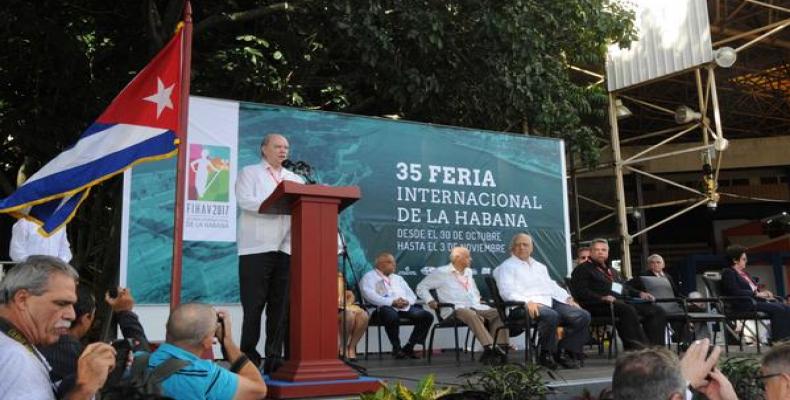Havana, October 31 (RHC-Xinhua) -- The 35th Havana International Trade Fair (FIHAV 2017) opened Monday in Cuba's quest to diversify its economy and attract foreign investment.
In his opening remarks, Cuban Minister for Foreign Trade and Investment Rodrígo Malmierca, pointed to the visionary thinking and the legacy of Revolution leader Fidel Castro, under whose initiative, the Havana trade fairs were started back in 1983.
Malmierca stressed that Fihav is widely regarded as the most important trade event in Cuba and the entire Caribbean area, and one of the most representative in Latin America.
Minister Malmierca said that despite the latest extreme weather phenomena battering the Caribbean and several other regions and nations the world over, the participation this time of 3,400 businesses and exhibitors from 70 countries further consolidate the Havana trade fair as a well-established event to promote trade and investment opportunities.
The top Cuban trade and foreign investment official explained that the country is currently facing "financial limitations."
“As it is well known, Cuba faces short-term financial limitations, due primarily to a decline in the prices of some of its main export items on the international market, the financial constrains suffered by some of the country's main trading partners and the further tightening of Washington's nearly six-decade long economic, financial and trade blockade against our country,” he said.
Despite this, said Malmierca, the large foreign presence at this year's fair further shows the interest of the international community in doing business with our country.
Regarding the U.S. blockade and relations between the United States and Cuba, Minister Malmierca said the latest anti-Cuba moves by the Trump Administration constitute a serious setback for the ongoing process toward fully normalized relations begun in 2014 by Presidents Barack Obama and Raúl Castro and progress achieved over the past few years in that direction.
“This is clearly a setback in bilateral relations, further aggravated by the totally unjustified decisions adopted by President Trump, which hinder travel, exchanges, business and cooperation between our two countries.
“The decisions of the president of the United States ignore the interests of large sectors of that nation, particularly the U.S. business community, who despite the old and new obstacles imposed by their government are still interested in doing business with Cuba.”
Minister Malmierca highlighted that since last year's fair, an important number of foreign investment projects have been approved in prioritized sectors of the Cuban economy. He mentioned renewable energies, mining, banking, tourism, construction and oil exploration, as well as the light, food and sugar industries.
“Without going into details about the concrete results achieved in 2017, which will be officially presented by our government before the National Assembly of People's Power at the end of this year, I can tell you that so far, we have approved foreign investment projects, whose overall value surpasses 2 billion U.S. dollars. Other projects are currently in advanced negotiation stages and should be approved before the end of the year. This is a sign that Cuba continues to be an attractive business destination.”
The Cuban official said the countries most represented at this year's fair are Cuba's main trading partners, Venezuela, Russia, China and Spain.
On Tuesday, October 30th, the 2nd Business Opportunity Forum was inaugurated by Minister Malmierca. It aims to provide foreign businessmen with detailed information about the country's updated foreign investment opportunities portfolio.
Cuba is represented at the trade fair by more than 300 companies and entities from all economic sectors, including the Mariel Special Development Zone.
A new law on foreign investment was approved in 2014 by the Cuban Parliament. It provides a favorable economic and investment environment for companies to set up joint ventures in the country.
The week-long Havana Trade Fair will feature business meetings, presentations and round table discussions where companies from all over the world will seek to make deals with Cuban firms and those of other nations.
China, which in 2016 became Cuba's top trading partner, had a showcase presentation of its pavilion on Tuesday, an event attended by top Cuban government officials.
The Cuba-China joint business committee will hold its annual meeting on Thursday in the framework of the trade fair.


